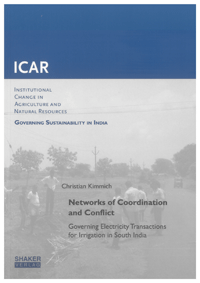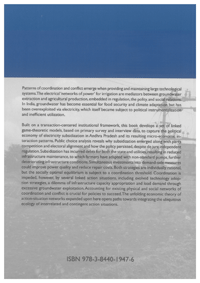
Shop : Details
Shop
Details
28,00 €ISBN 978-3-8440-1947-6Softcover202 pages26 figures302 g21 x 14,8 cmEnglishThesis
December 2013
Christian Kimmich
Networks of Coordination and Conflict
Governing Electricity Transactions for Irrigation in South India
Patterns of coordination and conflict emerge when providing and maintaining large technological systems. The electrical ‘networks of power’ for irrigation are mediators between groundwater extraction and agricultural production, embedded in regulation, the polity, and social relations. In India, groundwater has become essential for food security and climate adaptation but has been overexploited via electricity, which itself became subject to political instrumentalization and inefficient utilization.
Built on a transaction-centered institutional framework, this book develops a set of linked game-theoretic models, based on primary survey and interview data, to capture the political economy of electricity subsidization in Andhra Pradesh and its resulting micro-economic interaction patterns. Public choice analysis reveals why subsidization emerged along with party competition and electoral alignment and how the policy persisted, despite de jure independent regulation. Subsidization has incurred debts for both the state and utilities, resulting in reduced infrastructure maintenance, to which farmers have adapted with non-standard pumps, further deteriorating infrastructure conditions. Simultaneous investments into demand-side measures could improve power quality and reduce repair costs. Both strategies are individually rational, but the socially optimal equilibrium is subject to a coordination threshold. Coordination is impeded, however, by several linked action situations, including evolved technology adoption strategies, a dilemma of infrastructure capacity appropriation and load demand through excessive groundwater exploitation. Accounting for existing physical and social networks of coordination and conflict is crucial for policies to succeed. The unfolding economic theory of action-situation networks expanded upon here opens paths towards integrating the ubiquitous ecology of interrelated and contingent action situations. ■
Keywords: Governing Sustainability; Governing Electricity Transactions; Irrigation; South India; Infrastructure Research; Energy Efficient Irrigation
Institutioneller Wandel der Landwirtschaft und Ressourcennutzung - Institutional Change in Agriculture and Natural Resources
Edited by Prof. Dr. Volker Beckmann and Prof. Dr. Konrad Hagedorn, Greifswald und Berlin
Volume 48
Available online documents for this title
You need Adobe Reader, to view these files. Here you will find a little help and information for downloading the PDF files.
Please note that the online documents cannot be printed or edited.
Please also see further information at: Help and Information.
Please also see further information at: Help and Information.
| Document |  | Document | ||
| Type |  | |||
| Costs |  | 21,00 € | ||
| Action |  | Purchase in obligation and download the file | ||
| Document |  | Table of contents | ||
| Type |  | |||
| Costs |  | free | ||
| Action |  | Download the file | ||
User settings for registered online customers (online documents)
You can change your address details here and access documents you have already ordered.
User
Not logged in
Export of bibliographic data
Shaker Verlag GmbH
Am Langen Graben 15a
52353 Düren
Germany
Am Langen Graben 15a
52353 Düren
Germany
Mon. - Thurs. 8:00 a.m. to 4:00 p.m.
Fri. 8:00 a.m. to 3:00 p.m.
Fri. 8:00 a.m. to 3:00 p.m.
Contact us. We will be happy to help you.



